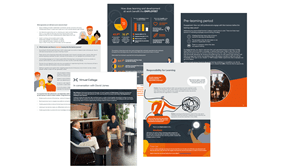Using PESTLE Analysis for Learning and Development Content
Launching and marketing any product to a different audience presents a logistical challenge, especially if you’re taking your offering to another country. When it comes to digital learning and development content, understanding how a new market might receive your training courses and resources is integral to a successful launch.
There are a range of different frameworks and methods used to determine risk and understand how a product or service is going to be received in the future in a new environment. One of these is PESTLE, which offers a range of different contexts to consider your offering in to help you understand what factors might influence its impact.
This article discusses how PESTLE social factors are taken into consideration when developing e-learning content for our international clients or when an existing client is looking to expand internationally.
What Is the PESTLE Analysis?
Introduced nearly 50 years ago by Harvard Business School professor Francis Aguilar, PESTLE stands for Political, Economic, Socio-cultural, Technological, Legal and Environmental. The concept outlines six features that make up the environment and market in which a product will be launched, prompting a comprehensive consideration of its impact, both positive and negative.
PESTLE analysis for learning and development is a tool that helps to consider how a new or existing piece of e-learning content will be engaged within a different context. This is incredibly useful in cases where an organisation wants to offer a training program to employees or customers from another country, as it’s rarely as straightforward as being able to just introduce an existing resource to a new market.
To help illustrate the purpose of PESTLE analysis in an L&D context, below we explain the six social factors in PESTLE analysis and how we’ve used them when adapting our learning and development content.
Political
Political factors in PESTLE refer to the extent to which a government and political issues might impact an industry or the economy. This often means considering things like taxes, new industry standards or tariffs that a government introduces, but can also refer to wider political issues that could influence the content of the offering.
An example of the benefits of PESTLE analysis was when Virtual College undertook a large project creating military courseware for a client in the Middle East. Many issues which may not immediately come to mind were considered because of the framework, such as maps that could not include the disputed territory of Israel. Being aware of international issues guides how content is created, so this is important to consider when taking L&D resources to new countries.
Economic
Economic factors are also important to consider because of how a country’s economy could have an impact on a company’s economic performance. This is really important to consider in terms of sales and projected profits, as if customers are facing economic difficulties on a country-wide scale then selling a new product or service to them is going to be more difficult.
Socio-Cultural
Social factors in PESTLE analysis refer to the social environment of the market, which includes demographic details, cultural expectations and current trends. This is one of the most important points to consider in a PESTLE analysis because socio-cultural factors can change more quickly over time. Making a cultural mistake can also have very negative effects on a company’s overall reputation as well as the performance of its product, so there’s a lot to consider to minimise risk.
As mentioned earlier, when we were working for clients in the Middle East, the representation of people was extremely important. In this case, we were not permitted to show any women in our learning content and all faces had to be blank.
But even something as seemingly simple as creating a food hygiene course for Burma has thrown up unique challenges. The pictures of the food had to be relevant to the learners, as there is no point in showing images of food which would be unfamiliar to a Burmese chef.
We have also recently worked on a project with Fujitsu which has been translated into many different languages. This means that not just images, but also the text we write has to be ‘translatable’.
For example, in the UK, ‘tailgating’ is a term we use to describe someone who is driving too close to the car in front. But in the USA, it means a party or social event held on and around the open tailgate of a vehicle.
When writing a course about safe driving, it was better to write ‘Do not drive too closely to the car in front’ rather than ‘Do not tailgate’. This also means when it was translated, the intended meaning was not lost.
Technological
In general, technological factors in a PESTLE analysis involve considering whether current technological advancements are going to affect a product’s launch and also potentially how a product is used. This is particularly relevant in PESTLE analysis for learning and development because of how many L&D resources are now available in a digital format.
One of the key things we’ve had to think about is the devices being used by learners to take courses. When we previously worked with the European Centre for Medium-Range Weather Forecasts (ECMWF), we were advised that the courses would only be taken on PCs. This information is important; as we often need to create our course content for a range of devices such as iPads or mobile phones and make sure, they are optimised for the best learner experience.
Legal
Legal factors are very important to consider in a PESTLE analysis, as failing to consider these could cost your company’s resources and reputation. Not only should you consider laws and regulations in the country you’re targeting, but the purpose of PESTLE is also to ensure that companies uphold their own internal standards and policies to continue compliance.
Legal factors often dictate how our e-learning content is developed. Changes in law mean our content has to be regularly updated and this is the same in international contexts.
For example, our Food Safety and Hygiene courses are developed differently according to local laws, as how we can prepare and handle food differs across the world. In America, chickens are commonly washed with chlorine, however this is banned under EU Law. Any course content regarding food and drink is changed to reflect the local law of the country it is developed for.
Another example is when GDPR came into effect and all businesses had to be more transparent with how they store and share customer data. As it is a European piece of legislation, it affected all our customers within the European Union and all changes had to be implemented by May 25th.
At Virtual College, we sent out an email asking people to re-subscribe if they were happy to continue receiving our information. In addition to this, we created free resources and an ‘Essentials of GDPR’ Course to help share knowledge on what the changes meant and how to implement them.
Environmental
In a PESTLE analysis, environmental factors are anything that is determined by or influences the environment of the place where a product or service is offered. In the context of learning and development, environmental factors also affect how course content is delivered and developed.
Our award-winning Carbon Literacy course was intended to teach learners about their carbon footprint. This is especially relevant for us at Virtual College, as e-learning means no paper and no time spent travelling to undertake face-to-face training. Companies are increasingly aware of their ecological impact.
When we work with clients we use our Learning Management System to deliver content which reduces our carbon footprint and paper waste. As an e-learning company, we are aware of our carbon footprint and take pride in offering e-learning solutions to avoid the need to travel to training centres.
We also encourage our clients to be more conscious of their carbon footprint. Our practices reflect this, for example, upon completion of a course we offer a digital certificate as standard although there is the option of a printed one.
Why Is PESTLE Analysis Important?
At Virtual College, we work with a range of different factors in the UK and overseas. Our experience working in different countries and within different cultures means we can successfully tailor content to suit local needs, whether that means using different languages, adapting course content or taking into consideration PESTLE factors.
Many factors influence the design of our e-learning content right through to the delivery and the considerations that are taken into account when delivering a project to different markets. The content which we would create for a safeguarding board in the UK may vary greatly from the content which we would create for a client in a different country. Different factors need to be taken into consideration, and that is where the PESTLE model is useful.
FAQs
Who created PESTLE analysis?
PEST analysis was first introduced nearly 50 years ago by Harvard Business School professor Francis Aguilar. He first published the idea in the book ‘Scanning the Business Environment’ which only focused on political, economic, socio-cultural and technological issues, but over the past few decades, it has been adapted and extended to remain relevant.
Why is PESTLE analysis used?
PESTLE analysis is used as a model that ensures all potential risks and outcomes have been considered and prepared for in the strategising stage of a project. The framework of different factors provides prompts that businesses can use to consider their offering, service or messaging from a different perspective, which helps to minimise the risk of errors or issues later on.
How does PESTLE analysis help a business?
PESTLE analysis helps businesses because it provides a framework for imagining potential risk and impact before a project actually reaches the stage where it could cause problems. By running through each of the factors outlined in PESTLE, businesses can mitigate risks and make sure that they’re prepared to launch their offering in other contexts, especially when it comes to going international.
Summary
Working in a global market brings many challenges, but also many exciting opportunities. PESTLE analysis is a great starting point when undertaking a new e-learning project, as it forces us to ask questions which we may not have thought of initially and helps to avoid potentially risky situations by considering all possible outcomes early on.
Our content development team and project delivery team have over 20 years’ of experience working across many diverse cultures, to help deliver learner-focused outcomes, which align with organisational goals. If you’re looking for learning and development services that deliver exceptional results across countries and cultures, take a look at our training courses or get in touch to speak to the team about how we can help.























